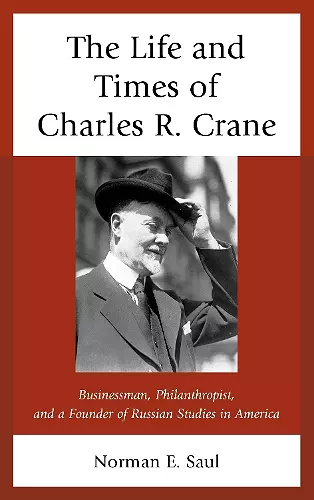The Life and Times of Charles R. Crane, 1858–1939
American Businessman, Philanthropist, and a Founder of Russian Studies in America
Format:Hardback
Publisher:Bloomsbury Publishing PLC
Published:21st Dec '12
Currently unavailable, and unfortunately no date known when it will be back

In The Life and Times of Charles R. Crane, Norman E. Saul analyzes the contributions of Charles R. Crane, world traveler, businessman, diplomat, and philanthropist in the setting of his times. Crane acquired his appreciation for Russian culture and life through travel in the country, making a total of twenty-four trips to Russia. He developed friendships and professional relationships with many prominent Russians in political, cultural, and artistic spheres in addition to his connections to important figures in American history such as Woodrow Wilson. As the son of a Chicago industrialist with little formal education, Charles R. Crane enjoyed remarkable success serving as a financial backer and advisor to the Woodrow Wilson administration, founding member of the 1917 Root Commission to Russia, minister to China, and establishing a factory in Russia to manufacture air brakes for the Russian railroad. He devoted a considerable amount of his own time and resources to educating Americans about the Russian people. He sponsored visiting lecturers, subsidized publications, and commissioned works by Russian artists.
Charles Crane was arguably the first true American globalist. His activities involved Russia, China, and the Middle East, but Saul emphasizes his travels in Russia and his role in the development and promotion of Russian studies in America. Crane represented the United States becoming a world power in business and diplomacy, and fostered an American appreciation and knowledge of Russian, Asian, and Middle Eastern societies. By studying this unusual man, Saul explores the world in which he lived and traveled. The relationship between America and Russia has always been a complex and fascinating one, and Saul shines light on a pivotal period in that relationship.
Norman E. Saul’s thoroughly documented book attempts to bring together the dispersed strands of this restless man’s life and passions. This is by no means an easy undertaking...As one reads Saul’s account, it is impossible not to be impressed by the sheer number of Crane’s journeys as well as the variety of their itineraries....Saul undertook a daunting task, [with] his editorial decision to tread lightly and give Crane the benefit of the doubt allows him to present a largely empathetic portrayal that will ultimately be appreciated by those who want to see Crane in his complexity. Saul’s book brings us several steps closer to understanding Crane and in the process offers a new perspective on the operations of early twentieth-century diplomacy and the origins of Russian Studies in the United States. * The Russian Review *
Norman E. Saul is a serious scholar. . . . Saul’s scholarship has been characterized by detailed accounts backed by extensive research. ... Saul is to be congratulated for delivering a very interesting account of Crane’s life during America’s emergence as a world power. * Journal of American History *
While being the first and brilliant biography of Charles R. Crane, the new Norman Saul’s book is also a biography of American society and Russian-American relations in the decades when the United States emerged as a world power. -- Victoria I. Zhuravleva, Russian State University for the Humanities
Charles R. Crane is a pivotal, controversial, colorful— and until now, mostly overlooked—figure in the 1880s to 1930s U.S. rise to world power. Norman Saul, exploiting newly available letters and documents, has finally given us a major biography that deals with (among the many obsessions of a full life), Crane’s Gilded Age financial power; significant diplomatic experiences with the Chinese and Russian revolutions; anti-Semitism; initial American dealings with the oil-rich Saudis; direct involvement with Woodrow Wilson’s failure to find a long-lasting peace; and even the beginnings of Russian studies in U.S. universities. Professor Saul’s work should reopen important questioning of some historic issues that most have thought settled. -- Walter LaFeber
Charles R. Crane received minimal formal education, however, he became instrumental in developing Russian studies in the US and helped reconstruct the remains of the ancient Austro-Hungarian, Ottoman, Russian, and Chinese Empires after the First World War. His life personifies America’s rise from the status of a provincial country to a world power. This book is rich in details both of Crane’s personal life and of the US relations with the Central Europe, Russia, China and other remote lands in the late 19th- and first quarter of the 20th Century. I recommend it for those who want to understand the circumstances of the US entering international affairs, the sources of its policies toward Central Europe, Middle East or Russia, or to learn about the career of a person who confidently faced the end of the old world and helped design a new one. -- Ivan Kurilla, Volgograd State University
ISBN: 9780739177457
Dimensions: 235mm x 160mm x 30mm
Weight: 640g
334 pages